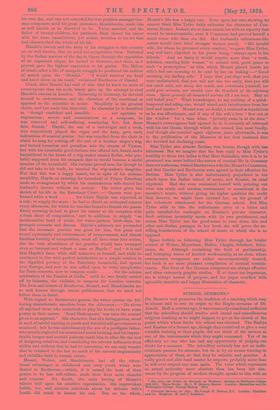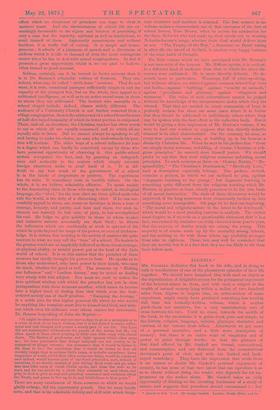SCHOOL SERMONS.*
Dn. BENSON well preserves the tradition of a teaching which may be almost said to owe its origin to the Rugby sermons of Dr. Arnold. Half-a-century ago, it was commonly considered sufficient that the schoolboy should receive such casual and miscellaneous religious teaching as he might happen to get at the church of the parish within whose limits his school was situated. The Busbys and Keatses of a former age, though they contrived to give a very valuable training to their pupils, did not think of the sermon as one of the instruments which they might command. Yet of its efficiency no one who has had any opportunity of judging can doubt for a moment. The schoolboy certainly has not an indis- criminate passion for sermons, but he is by no means wanting in appreciation of them, so that they be suitable and genuine. A really good and able head master he respects probably more than he will ever respect any man again. The voice which represents an actual authority more absolute than has been left else- where by the progress of modern thought, speaks to him with an • Boy Life,—its Trials, its Strength, its Weakness: Sundays in Wellington College, 1859-1873. Three Books. By 0. W. Benson, Master. London: Macmillan and Co. Wellington College : George Bishop. 1874.
• Practical Sermons for Boys. By Joseph H. Hutton, B.A. Landon: Hamilton and Co. Brighton: H. and C. Trencher. effect which no eloquence of preachers can hope to rival in maturer years. And the circumstances of school life are ex- ceedingly favourable to the vigour and interest of preaching, if only a man has the capacity, spiritual as well as intellectual, to avail himself of them. Apparently monotonous and without incident, it is really full of variety. It is simple and homo- geneous ; it admits of a plainness of speech and a directness of address which it is idle to demand of even the most courageous orator when he has to deal with mixed congregations. In fact it presents a great opportunity, which is, we are glad to believe, often turned to good account.
Seldom, certainly, can it be turned to better account than it is in Dr. Benson's admirable volume of Sermons. They are, indeed, what may be called " sixth-form " sermons. They do not want, it is true, occasional passages sufficiently simple to suit the capacity of the youngest boy, but on the whole, they appeal to a cultivated intelligence, as well as to an active moral sense in those to whom they are addressed. The hearers who assemble in a school chapel include, indeed, classes widely different. The audience of a University Church is not further removed from a village congregation, than is the aristocracyof a school from themass of half-developed humanity of which its lower portion is composed. There, indeed, as elsewhere, the Christian teacher has often words to say in which all are equally concerned and to which all are equally able to listen. But he cannot always be speaking to all, and having to make his choice, no man who understands his posi- tion will hesitate. The older boys of a school influence its tone to a degree which can hardly be conceived, except by those who have personal opportunity of observing it. Our public-school system recognises the fact, and, by granting an independ- ence and authority to the seniors which simply astonish foreign observers, seeks to avail itself of it. It is dif- ficult to say how much of the government of a school is in the hands of prepositors or prefects. The experiment has its risks. It sometimes ends in terrible failure. On the whole, it is, we believe, admirably effective. To speak mainly to the dominating class, to those who may be called, in theological language, the "elect," for the true elect are those gifted souls who rule the world, is the duty of a discerning chief. If he can suc- cessfully appeal to them, can create or develope in them a tone of courage, honesty, and purity, and here and there, for such in- stances can scarcely be but rare, of piety, he has accomplished his end. He helps to give nobility to those in whom weaker and imitative natures necessarily see their ideal ; he directs the influences which are continually at work in spheres of life which lie quite beyond the range of his power, or even of his know- ledge. It is certain that nothing in the society of maturer life quite answers to what we may call the "tone" of a school. No leaders in the greater world are so implicitly followed as those whom courage, or physical ability, or mental power put at the head of the little world of schooL It is on this matter that the preacher of these sermons has chiefly brought his power to bear. He speaks as to those who understand, who have power in their hands, who may do much, whether for good or evil. The sermons on " Risking our Influence " and " Leaders Astray," may be noted as dealing very wisely with this subject. Nor must we omit to notice the true spiritual wisdom with which the preacher has put in close juxtaposition with these sermons another, which raises its hearers into a higher level of feeling than that which even the best- ordered society can of itself produce. " Escaping the Average " is a noble plea for that higher personal life which he who would be anything like complete must live to himself and God, and with- out which even his influence over others cannot but deteriorate. Dr. Benson is speaking of John the Baptist :— " It might be absurd for any one now-a-days to go to a mountain or to a river, to seek or to teach wisdom, but it is not absurd to make retire- ment and real thought and prayer a steady part of our life. Our Lord did not contemplate wildernesses for people of the towns, but He did often speak to them about praying in their own little room with closed doors. The flashes of good-sense and right opinion which often cross us ; the trim perception that things temporal are not worthy to be compared to things eternal ; the assurance that it would be better to die than to lie ; the conviction that it would be better to lose all worldly things than to profane God's name, or to defile ourselves ; these fragments of truth, which float often across our brain, would be rendered ours indeed, would become part of our fixed principles, part, indeed, of ourselves, if we would, instead of just letting them come and go, enter into that little room of which Christ spoke, and close the door as he says, and fix our minds for a short time earnestly on such ideas, and pray to God to give us real and practical assurance and certainty about the Truth, and grace to live up to it, and faithfulness to that grace."
There are many excellences of these sermons on which we would gladly enlarge, did the opportunity permit. One we must briefly note, and that is the admirable felicity and skill with which Scrip- ture character and incident is adapted. The first sermon in the volume makes a characteristic use of that utterance of the first of school heroes, Tom Brown, when he avows his admiration for the three Hebrews who had made up their minds not to worship Nebuchadnezzar's image, whether their God would deliver them or not. "The Trophy of the Boy," a discourse on David taking in after-life the sword of Goliath, is another very happy instance of the same habit of thought.
The little volume which we have associated with Dr. Benson's is not unworthy of the honour. Mr. Hutton speaks, it is evident, to a different kind of audience than that to which the other dis- courses were addressed. He is more directly didactic. Ile de- scends more to particulars. Warnings, full of plain-speaking, but without offence, are uttered against common school-boy vices and faults,—against " bullying," against " cruelty to animals," against "greediness and gluttony," against "stinginess and meanness." The value of such exhortations cannot be judged without the knowledge of the circumstances under which they are uttered. That they are needed in every community of boys is perfectly certain, but there are some cases where it is better that they should be addressed to individuals, others where they may be spoken with the best effect to the collective body. But it would be giving a false impression of Mr. Hutton's volume, if we were to lead our readers to suppose that this directly didactic element is its chief characteristic. On the contrary, he aims, as every true preacher must aim, at building up in his hearers a distinctly Christian life. When he says in his preface that " these are simply moral sermons, unfolding, of course, Christian or reli- gious principles," he scarcely does himself justice. We should prefer to say that they were religious sermons unfolding moral principles. To such sermons as those on "Human Nature," "Re- sponsibility," " The Christian's Destination," "Brotherly Love," such a description especially belongs. The preface, indeed, contains a protest, in which we are inclined to join, against " dogmatic teaching to the young ;" but dogmatic teaching is something quite different from the religious teaching which Mr. Hutton, in practice at least, clearly perceives to be the true basis of all moral instruction. The style of these discourses would be improved, if the long sentences were occasionally broken up into something more manageable. On page 54 we find one beginning, "The moral and religious nature is the latest to be developed," which would be a most puzzling exercise in analysis. The author must forgive us if we note as a questionable statement that it is a fact, ascertained by statistics carefully observed from year to year, that the majority of deaths yearly are among the young. This majority is of course made up by the mortality among infants, and has nothing to do with those whose age probably averages from nine to eighteen. These, too, may well be reminded that they are mortal, but it is a fact that they are less likely to die than their fellow-men.



































 Previous page
Previous page